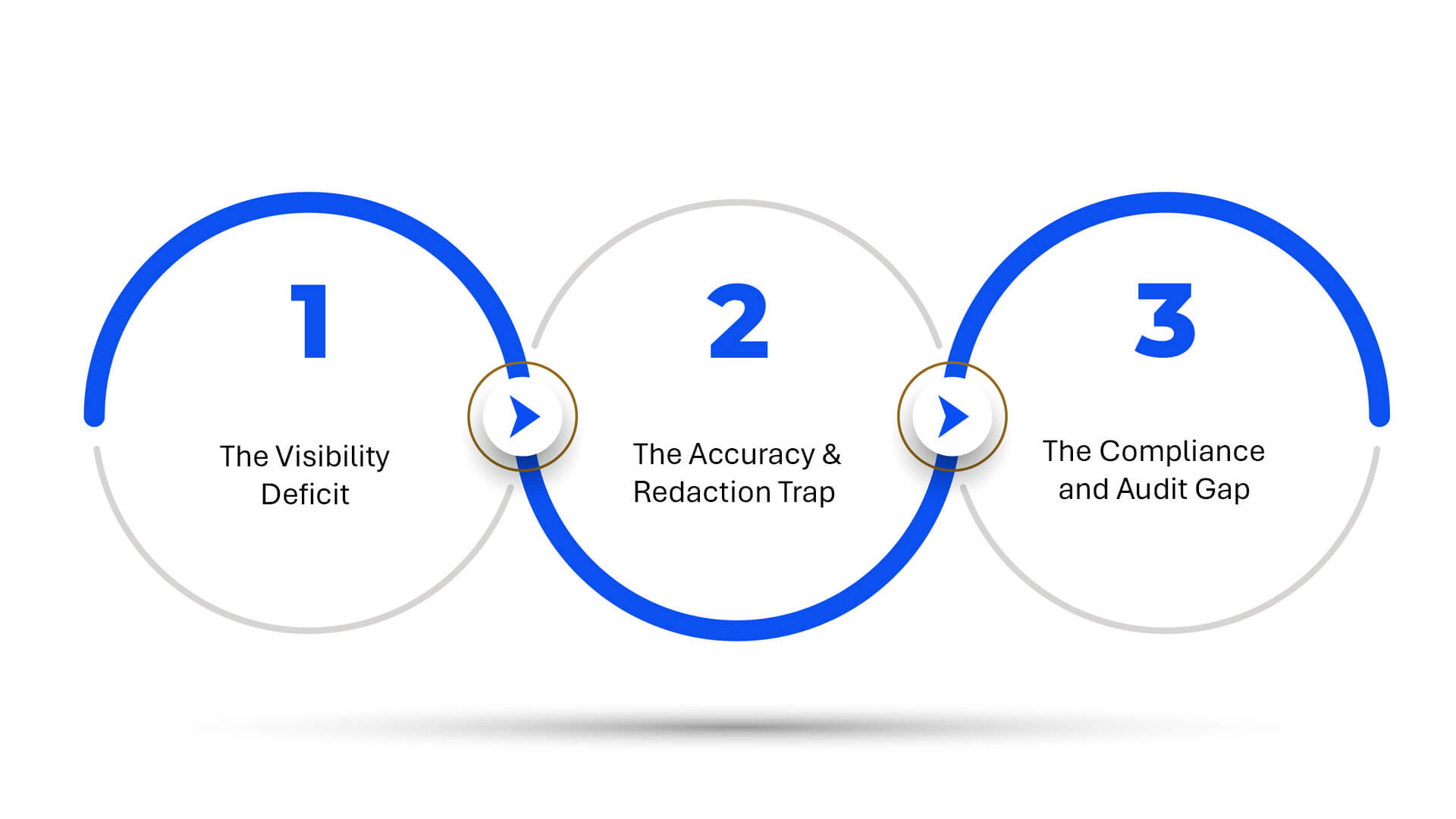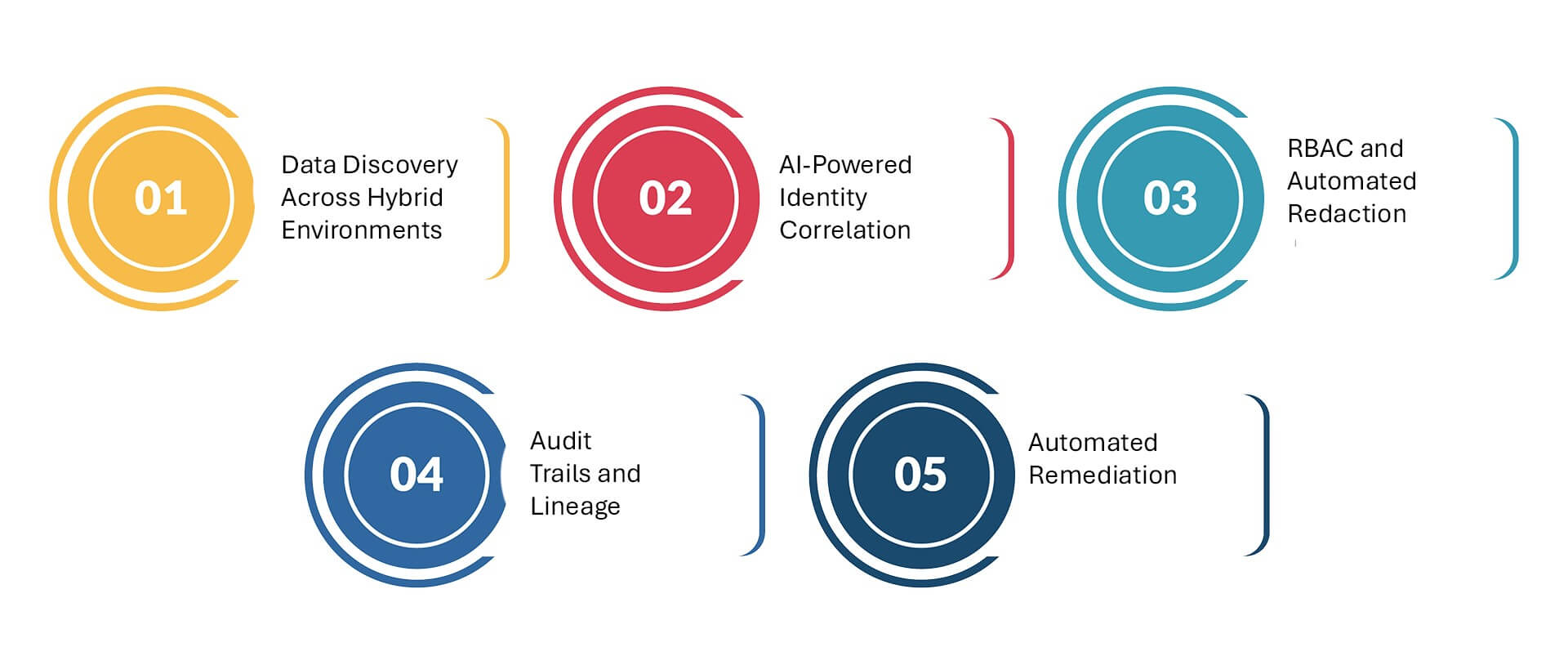In today’s data-sovereign world, the power balance has shifted. Individuals are no longer silent consumers of services—they are empowered by data privacy laws to access, correct, or even erase their personal information. Regulations like the General Data Protection Regulation (GDPR), the California Consumer Privacy Act (CCPA), and India’s Digital Personal Data Protection (DPDP) Act give people the right to submit Subject Access Requests (SARs)—also known as Data Subject Access Requests (DSARs).
For enterprises, this empowerment has created an urgent compliance challenge. Data is no longer confined to a single structured database—it sprawls across email archives, shared drives, SaaS applications, public cloud stores, and collaboration platforms. Each SAR can reference different categories of personal data scattered across these environments. Organizations are now tasked with locating, reviewing, and redacting the requested information within strict time limits—typically 30 days under GDPR.
This complexity has made the SAR process manual, reactive, and risk-heavy, exposing enterprises to severe consequences:
- Compliance Violations and Regulatory Fines: Failing to respond within the required days to respond window can invite penalties from supervisory authorities such as the ICO or Data Protection Commission.
- Reputational Fallout: A delayed or poorly handled SAR can erode customer trust and trigger consumer complaints.
- Operational Drain: Legal, IT, and compliance teams spend enormous time and budget fulfilling DSARs, driving up administrative costs.
Beneath all this lies a deeper truth: you cannot honor data rights when you don’t know what data you hold, where it lives, or how it’s used.
That’s why the future of SAR fulfillment rests on a modern, AI-powered data discovery and management platform that can automate compliance, minimize risk, and deliver auditable SAR responses—without chaos.
Three Core Challenges Slowing SAR Readiness

The manual DSAR process fails to address three fundamental hurdles:
1. The Visibility Deficit
With unstructured data scattered across hybrid environments, organizations lack a data inventory that can federate discovery across all systems. Without data mapping and classification, legal teams risk missing relevant information, resulting in incomplete or non-compliant responses.
2. The Accuracy & Redaction Trap
Even when relevant files are found, they often include information about third parties or sensitive business content. Without intelligent classification and automated redaction, organizations risk either over-disclosing confidential data or refusing to comply with valid requests—both leading to regulatory and reputational consequences.
3. The Compliance and Audit Gap
It’s not enough to simply respond to a SAR; regulators expect a full audit trail. Most organizations lack traceability, making it impossible to prove compliance. Without detailed logs, data lineage, and role-based access control (RBAC), the defensibility of SAR responses collapses under regulatory scrutiny.
A Modern Approach to SARs

An intelligent SAR system addresses the entire lifecycle—from receiving a request on behalf of a consumer to packaging a regulator-ready response. Core capabilities include:
- Data Discovery Across Hybrid Environments: Identify and classify personal data without risky migrations.
- AI-Powered Identity Correlation: Connect scattered identifiers to an individual’s data profile.
- RBAC and Automated Redaction: Protect sensitive information while fulfilling requests.
- Audit Trails and Lineage: Demonstrate compliance to regulators with transparent reporting.
- Automated Remediation: Enforce policies, re-permission files, and reduce exposure risks.
This approach allows organizations to anticipate and automate DSAR responses, rather than scrambling to fulfill them manually.
A Closer Look: How AI Powers SAR Compliance
AI-driven systems redefine SAR handling by embedding intelligence into every step:
- Advanced Metadata & Content Analytics: Use metadata (creation date, author, access history) and deep content scanning to locate PII/PHI/IP across processing activities.
- Role-Based Access & File Re-Permissioning: Automate permissions to ensure only the right teams handle copies of their personal data.
- Data Usage & Traceability: Provide full visibility into who accessed what data, when, and why—a must-have for audits.
- Risk Analysis & Remediation: Flag manifestly unfounded or excessive requests, reduce exposure, and enforce compliance with regulations like GDPR and CPRA.
By turning fragmented workflows into an intelligent, automated system, organizations save time, lower costs, and minimize risks tied to consumer requests.
SAR Compliance, Without the Chaos
Subject Access Requests are not slowing down. As more individuals understand their data rights, the number of DSAR submissions will only increase. Regulators will continue demanding proof of compliance, while consumers will expect transparency and control.
Enterprises cannot rely on outdated, manual processes anymore. They need AI-driven data discovery, automated workflows, and robust governance to fulfill requests within the legally mandated subject access request time limit, without compromising on security or transparency.
Because in 2025, privacy isn’t just compliance—it’s a promise.
👉 Ready to take control of SAR compliance? Talk to us today and see how intelligent data management can simplify your privacy obligations.






